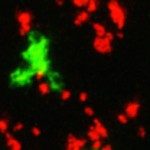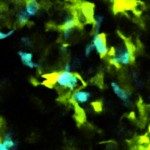Link to Pubmed [PMID] – 17360562
Proc. Natl. Acad. Sci. U.S.A. 2007 Mar;104(11):4553-8
The regulation of T cell-dendritic cell (DC) contacts during clonal expansion is poorly defined. Although optimal CD4 T cell responses require prolonged exposure to antigen (Ag), it is believed that stable T cell-DC interactions occur only during the first day of the activation process. Here we show that recently activated CD4 T cells are in fact fully competent for establishing contact with Ag-bearing DC. Using two-photon imaging, we found that whereas prolonged interactions between activated T cells and Ag-bearing DCs were infrequent at high T cell precursor frequency, they were readily observed for a period of at least 2 days when lower numbers of T cells were used. We provide evidence that, when present in high numbers, Ag-specific T cells still gained access to the DC surface but were competing for the limited number of sites on DCs with sufficient peptide-MHC complexes for the establishment of a long-lived interaction. Consistent with these findings, we showed that restoration of peptide-MHC level on DCs at late time points was sufficient to recover interactions between activated T cells and DCs. Thus, the period during which CD4 T cells continue to establish stable interactions with DCs is longer than previously thought, and its duration is dictated by both Ag levels and T cell numbers, providing a feedback mechanism for the termination of CD4 T cell responses.

